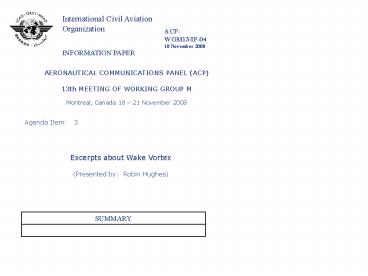PowerPoint Template PowerPoint PPT Presentation
1 / 16
Title: PowerPoint Template
1
AERONAUTICAL COMMUNICATIONS PANEL (ACP) 13th
MEETING OF WORKING GROUP M Montreal, Canada 18
21 November 2008
Agenda Item 3
Excerpts about Wake Vortex (Presented by Robin
Hughes)
2
Russian Integrated Wake Vortex Flight Safety
System
- A. Belocerkovsky, E. Falkov, M. Kanevsky
- State Research Institute of Aviation Systems
(GosNIIAS)
3
National programs for Wake Vortex Flight Safety
Vortex Safety and Capacity System ATC Wake,
Credos SESAR Programme
Wake Vortex Advisory System WakeVAS NextGen
Programme
4
Practical task
How to include a pilot in the loop not using
crucial voice but contemporary two-way data
link and not in unclear future but today because
development, validation and getting ICAO SARPs
will take long time and demand remarkable
funding
5
The Concept of the Integrated Wake Vortex Flight
Safety System
6
Main ADS-B Transmission Data(VDL mode 4)
- Track angle, ground and vertical speed
- Near-term intents
- Turn rate
- Aircraft type
- Aircraft weight
- Coordinate and circulations of free vortices
- Temperature, pressure
- Sender category
- Sender ID
- Latitude, longitude, altitude
- Aircraft identification index
- Quality index
- Heading, instrumental speed
- Wind, turbulence parameters
Extra parameters for the integrated wake vortex
safety system
7
Full standard for VDL-4
- ETSI EN 302 842-2 V1.2.1 (2006-12)
- European Standard (Telecommunications series)
- Electromagnetic compatibility
- and Radio spectrum Matters (ERM)
- VHF air-ground and air-air Digital Link (VDL)
- Mode 4 radio equipment
- Technical characteristics and
- methods of measurement
- for aeronautical mobile (airborne) equipment
- Part 2 General description and data link layer
8
Wake Vortex Awareness of Aircraft Crew
Danger vortex area indication at the HUD
Danger vortex area indication at the CDTI
Vortex Vision System Software
9
Alerting Indication of WVS
Avoiding maneuver
Danger vortex area
Attention
Warning
Alert
10
Visualization of Wake Vortex Situation for Air
Traffic Controllers
Visualization for en-routeflights(area control
center)
Coordinated visualization on CDTI and ATC display
(airport control center)
11
Flight Tests of the Integrated Wake Vortex Flight
Safety System
Wake Vortex Generator Tupolev-154? (Flight
Research Institute)
Wake Vortex Sounding Aircraft L-39 (Flight
Research Institute)
Wake Vortex System Onboard Module (RAA
Spetstekhnika)
ADS-B Equipment (State Institute for Aviation
System Research)
Wake Vortex System Ground-Based Module (NITA)
12
Wake Turbulence Safety at the 36th ICAO
AssemblyMontreal (Canada), September 18-28, 2007
The Secretary indicated that the Air Navigation
Commission was actively involved in work on wake
turbulence and would certainly take this paper
into account in its future work, which would
also consider information on wake turbulence
encounters and the results of a working group on
wake turbulence categorization and separation
minima.
The Assembly is invited to recommend that the
Council examine the possibility of including the
development of basic requirements for airborne
and ground components of an integrated wake
turbulence safety system in the ICAO Technical
Work Programme
13
Schedule Chart for the WVS Developing
The system pilot project
Engineering design of the WVS, development
normative-technical and certification basis
WVS tests and certification
WVS operation
1. RD of the onboard module 2. RD of the
ground-based module 3. RD of special
meteorological equipment 4. Special technical
conditions for certification 5. Proposals for
changing flight rules
1. Certified prototype of the WVS 2. Preparation
for serial production 3. Trial operation of the
WVS
Serial production of the WVS and commencement of
operation
1. WVS Concept 2. Ground-based module 3. Onboard
module 4. Flight tests of the WVS prototype
Participation in a special group of the ICAO for
development of the requirements for the VVS and
SARPs
2015
2010
2014
2012
2003
2008
2009
.2007
2011
2013
14
Harmonization of Requirements for National Wake
Vortex Flight Safety Systems
Safety, technical and economic assessments of
the Integrated System
Next necessary steps
Development SARPs for Annexes 2, 3, 6, 8, 10,
11, 14 to the Convention on International Civil
Aviation
Development of the coordinated requirements and
characteristics for airborne and ground-based ATM
systems
Development of the harmonized requirements and
characteristics for datalinks
Development of specifications for certification
of the Integrated System
A specialized working group under the guidance of
the ICAO
15
Some short movie
16
Instead of Summary
- WakeNets of all countries, please unite!
- Share research results to save resources,
- not to duplicate studies.
- 3. Discuss different wake vortex models,
- carry out independent verification.
- 4. Hold united technical events, on bi-lateral or
multilateral agreements background carry out if
possible joint investigations and projects, - development of concepts, possible solutions
and base regulatory approaches. - It is much better to discuss all disputable
issues - before than to do it during ICAO SARPs approval.
- 5. Try to consider on mutual benefits background
to develop if possible joint HW SW ground and
airborne equipment to solve wake safety problem
(mandatory in future? why not?)

